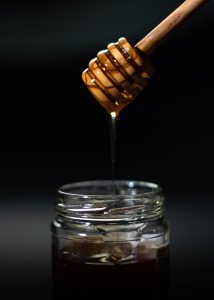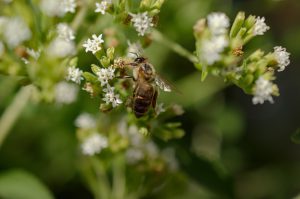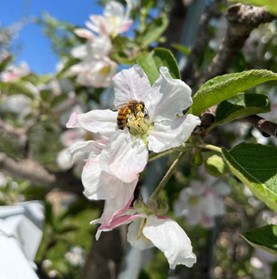6 Health Benefits of Honey
The sweet stuff can help with burns, coughs, anxiety and more
By Alison Gwinn,
AARP

Photo by Daily Slowdown on Unsplash
Honey’s benefits have been touted since antiquity — and it turns out the ancient Greeks and Romans were onto something: Honey really can hit the sweet spot when it comes to our health.
Though honey — a sweet, sticky liquid made by honeybees from flower nectar — is technically a sugar, “it’s also really rich in a lot of different bioactive substances,” says Mayo Clinic registered dietitian (and hobbyist beekeeper) Joy Heimgartner. Those include a range of good-for-you minerals, probiotics, enzymes, antioxidants and other phytochemicals.
There are four common types of honey: Raw honey is defined by the National Honey Board as “honey as it exists in the beehive or as obtained by extraction, settling or straining without adding heat.” Manuka honey, produced from the flowers of manuka trees, is known for its unique antibacterial properties, attributed to a compound called methylglyoxal, says Jordan Hill, lead registered dietitian for Top Nutrition Coaching.
Organic honey is produced without the use of synthetic chemicals, pesticides or GMOs. And locally produced honey has been reported to provide relief from seasonal allergies to local pollen, though scientific evidence to support that claim is limited, says Hill.
According to Hill, honey can be substituted for sugar in recipes, but remember: It has a distinctive flavor (which varies depending on the source flowers); it’s sweeter than sugar (the general rule of thumb is to use ¾ to 1 cup of honey for every 1 cup of sugar); it’s a liquid, so you may need to cut back on other liquids or slightly increase the dry ingredients in a recipe; and it browns more quickly than sugar (so reduce the oven temperature by 25°F).
But whatever way you use honey — in a recipe or as a condiment — always keep in mind that it is a sweetener. “Honey is a supersaturated sugar solution, and we should limit added sugars of all types,” says Heimgartner. Still, “if you’re looking for a sweetener that has more to offer, honey is fantastic.” Here are six reasons why.
- Honey doesn’t raise your blood sugar as rapidly as white sugar
“Honey is metabolized differently from white sugar and produces less of a sugar spike,” says registered dietitian and nutritionist Dawn Jackson Blatner, author of The Flexitarian Diet. “Research suggests that honey may enhance insulin sensitivity and may support the pancreas, the organ that produces insulin.” A 2018 review of preliminary studies points to honey’s “hypoglycemic effect” and use as a “novel antidiabetic agent that might be of potential significance for the management of diabetes and its complications.”
And a 2022 study out of the University of Toronto found that honey improves important measures of cardiometabolic health, including blood sugar, cholesterol and triglyceride levels, especially if the honey is raw and from a single source.
- Honey can help with wound or burn therapy
“Honey has been used for wound healing for centuries, and certain types of honey, like medical-grade honey, have shown potential in wound management due to their antimicrobial properties and ability to promote healing,” says Hill, who nonetheless advises consulting health care professionals for appropriate wound care. Heimgartner, a board-certified oncology specialist, says, “There’s actually a lot of evidence that using honey during oral cancer radiation treatment helps to prevent some of the nasty side effects of mucositis,” or inflammation of the mouth.
How does it work? “Research suggests that honey prevents or controls the growth of bacteria on the wound, helps to slough off dead tissue and microorganisms, and transports oxygen and nutrients into a wound for quicker healing,” says Blatner.

Native plants and naturalistic perennials attract bees and other pollinators.
Create Your Own Pollinator Garden
If you want to create your own pollinator garden for bees to forage in, consider these tips from Emily Erickson, postdoctoral researcher at the University of California, Davis, department of evolution and ecology.
- Opt for native plants or naturalistic perennials.
- Choose plants of varying colors, shapes and bloom times so you can support a variety of pollinators throughout the season.
- Avoid double-flowered varieties (those with extra petals) or plants that look drastically different from their wild relatives.
- Avoid pesticides.
- Leave areas in your yard that can serve as nesting habitats, such patches of bare soil, brush, twigs or woody stems, where many native pollinators make their homes.
- Which plants are right for you depends on your location and climate, so ask your local nursery for advice — or simply walk through a nursery and notice which plants seem to attract pollinators.
- Honey is rich in polyphenols, including flavonoids
Why does that matter? Because those two substances have both antioxidant and anti-inflammatory properties, meaning they protect our bodies against oxidative stress, which can manifest as cancer, heart disease or other diseases. But Hill cautions that the polyphenols in honeys can vary significantly, depending on the type of honey and its floral source.
- Honey can be an effective cough suppressant
A 2020 meta-analysis found that honey provides a widely available and inexpensive alternative to antibiotics in controlling cough frequency and severity, though it concluded that further studies were needed. “It is believed that honey’s thick texture and possible antioxidant and antimicrobial properties may provide relief for cough symptoms,” Hill says, but she adds the caveat that honey should never be given to infants under 1 year of age due to a risk of botulism.
- Honey may provide antidepressant or anti-anxiety benefits.
“Research suggests that polyphenol compounds in honey such as apigenin, caffeic acid, chrysin, ellagic acid and quercetin support a healthy nervous system, which may enhance memory and support mood,” says Blatner. Though more study is needed, a 2014 review of research says that one established nootropic (or cognitive-enhancing) property of honey “is that it assists the building and development of the entire central nervous system, particularly among newborn babies and preschool-age children, which leads to the improvement of memory and growth, a reduction of anxiety, and the enhancement of intellectual performance later in life.”
- Honey may support a healthy gut
Early research indicates that “honey has an extra-special ability to support a healthy gut microbiome because it contains both probiotics, or good bacteria, and prebiotic properties, which help good bacteria thrive,” says Blatner, though the evidence is limited. A 2022 paper funded by the National Institute of Health, Malaysia, concluded that “honey bees and honey, which have the potential to be good sources of probiotics and prebiotics, need to be given greater attention and more in-depth research so they can be taken to the next level.”
We are here to share current happenings in the bee industry. Bee Culture gathers and shares articles published by outside sources. For more information about this specific article, please visit the original publish source: https://www.aarp.org/health/healthy-living/info-2023/honey-health-benefits.html








